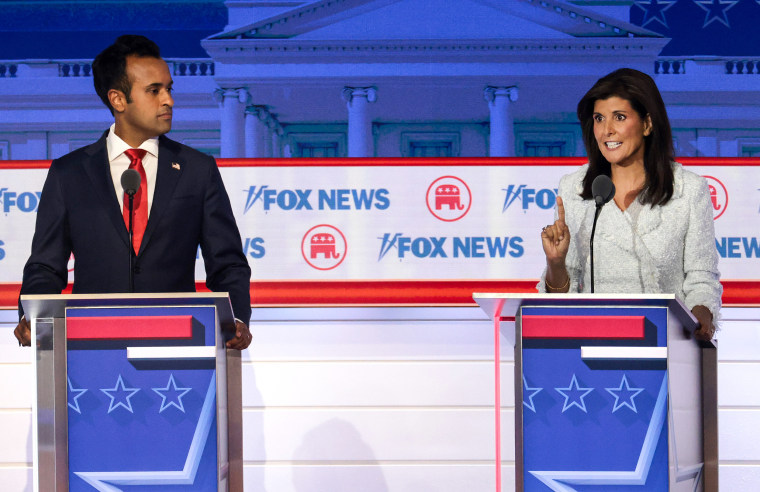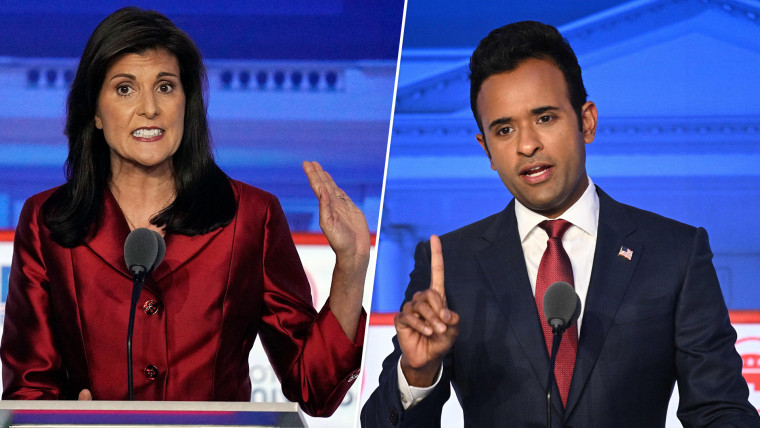Two Indian Americans dominated the stage at Wednesday night’s Republican presidential debate. It was a rare matchup and, with such a bright spotlight on them, much has been made of Nikki Haley and Vivek Ramaswamy's ethnicity. But new data shows Asian American voters don’t actually care about identity when it comes to casting their ballots.
A study released Tuesday by the Pew Research Center showed that, for the vast majority of Asian Americans, voting preferences had little to do with a candidate’s race. As many as 97% of Asian American voters said they cared more about candidates' policy positions than their race or ethnicity, the study showed.
Given that data, experts said, the two Republican stars weren’t likely to reel in community members with their identities alone — and they weren’t necessarily trying to.
“I think there might be an element of curiosity, novelty or even pride that Asian American voters feel with these two candidates doing as well as they’re doing,” said Karthick Ramakrishnan, founder of nonprofit group AAPI Data. “But it’s very unlikely to translate into votes.”
The majority of Asian American registered voters (62%) identified more with the Democratic Party, the study noted, while 34% preferred the Republican Party. Indian Americans were among the most progressive even under the Asian umbrella, with 56% identifying as Democrat and 15% as Republican, according to the 2022 Asian American Voter Survey.
“Nikki Haley and Vivek Ramaswamy stand very far to the right of where most Asian American voters are and where most Indian American voters are,” Ramakrishnan said. “It’s highly unlikely that an Asian American Democrat is going to cross the aisle and vote for an Asian American Republican candidate.”
Party lines usually hold firm for voters across ethnicities, despite the race of the candidates, he said. But the study also found that 68% of Asian American voters do want a national leader who advances the concerns of their communities.
“While there may be some initial affinity because a person might look like them … it’s extremely important to voters that they’re right on the policies,” said Varun Nikore, executive director of the AAPI Victory Alliance, a nonprofit group representing Asian Americans and Pacific Islanders. “So people may like Nikki Haley, but at the end of the day, ‘What has she done for the community?’”
A spokesperson for Haley told NBC News that as president, she would fight for all Americans.
“Like many first-generation Asian-Americans, Nikki Haley was raised on faith, family, and the promise of the American Dream,” the spokesperson said. “Sadly, Joe Biden is making it harder for so many Americans to reach that dream. Nikki will always work to lift up all Americans by cutting taxes, supporting our small businesses, getting government out of our lives, securing the border, and making sure we stand up to our enemies.”
The issues on which many Asian American voters converged were inflation, economic inequality, violent crime and racism, according to the Pew study. Ramakrishnan said the way candidates spoke about immigration and race also affected how likely Asians were to lend their support.
Ramaswamy specifically made headlines in recent weeks after promising to “gut” the skills-based H-1B visa program.
“The lottery system needs to be replaced by actual meritocratic admission,” he told Politico. “The people who come as family members are not the meritocratic immigrants who make skills-based contributions to this country.”
It’s something that won’t sit well with Asian American voters, especially Indian American voters, Ramakrishnan and Nikore said.
“Even if families didn’t come here as a direct result of the H-1B program, everyone knows somebody who did,” he said. “They’re your neighbors. So I don’t think that’s a policy that’s going to be helpful to him among the AAPI population.”
Ramaswamy’s team did not respond to a request for comment.
Ramakrishnan said that, ultimately, he doesn’t think Ramaswamy is trying to win the Asian American vote.
“In fact, by taking a stance like that, I think he is trying to signal to Republican voters that he’s not beholden to any community,” he said. “Including the immigrant community or the Indian immigrant community.”

